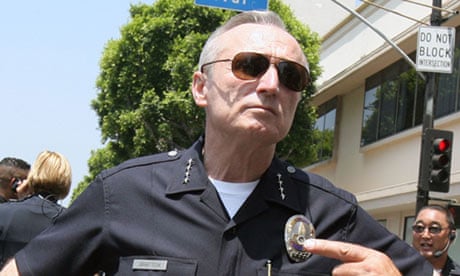The American "supercop" who could be Britain's first foreign police chief has said officers should make fewer arrests and send fewer people to prison to achieve big falls in crime.
In an interview with the Guardian, Bill Bratton said alternatives to imprisonment had helped deliver large falls in crime and in prison populations in the US, where he led the New York and Los Angeles police departments. This had been achieved despite budget cuts, which UK police chiefs have warned will lead to rising crime.
Bratton was targeted by the prime minister, David Cameron, to be Met commissioner in 2011 when there was a vacancy, but was blocked by a rule barring foreigners from being police chiefs in Britain. The government says that rule is now to be abolished.
Bratton said he was still interested in British policing's top job and revealed that, had the rule not been in place, he would have applied last time.
Police chiefs had to be open to ideas from other countries, Bratton said, adding that a radical new approach to crime fighting was needed and had proved successful in the US.
"You can't arrest your way out of the crime problem," said Bratton. "In the US we probably used arrest practices too extensively in the 80s and 90s. In the 21st century we are understanding that often alternatives to incarceration might be the better way to go.
"Arrest and incarceration … is appropriate for some people, the most violent among us, but it is not appropriate for a lot of others who can be dealt with more successfully and effectively with alternative means of rehabilitation, training, mentoring, monitoring and ministering."
Bratton said the priority for police should be changing behaviour and crime prevention. His tenure in New York began with a crackdown on minor offences, which he said was needed to show there was a penalty to pay for breaking the law. But, he added, there was then a "bell curve" effect where arrests first rose and then tailed off as people were more willing to comply with the law.
Bratton said any new approach should be applied case by case, with those involved in the drug trade being considered for alternative treatment, as well as pickpockets, thieves and car thieves. "If you put the more significant criminal in jail, the career criminal, the violent criminal, in jail, that prevents that person preying on society.
"But many other people, if given a second chance, understanding if they break the law there is going to be a penalty, choose not to."
Bratton pointed to big falls in crime and jail populations in New York, where prisons have since been closed. He said Los Angeles, where he was police chief for seven years until 2009, would see the same. All this was possible to achieve while police budgets were being cut, he said.
"I suggest you can look at other places, for example, New York – how New York [has] successfully been able to reduce its jail population, while at the same time reducing the size of police force, while at the same time reducing the amount of criminal behaviour."
Bratton said his interest in the Met commissioner role was as strong as ever and that his credentials "speak for themselves" in the "leadership and success I'm known for" in US policing.
The Met job became vacant in 2011 when Sir Paul Stephenson resigned in the wake of the phone-hacking scandal.
Bratton said that, had there been no bar to foreign nationals being commissioner, "it is quite likely I would have applied". He said the prospect of a vacancy was several years away, and that the current commissioner, Sir Bernard Hogan-Howe, was a friend whom he respected.
But with the last two commissioners having departed mid-term, and with some Tory MPs furious at the Met over "Plebgate", Bratton remains a contender in the wings.
Bratton praised Hogan-Howe, but said he was unfamiliar with the commissioner's flagship policy of "total policing". He insisted his age, 65, was no bar to becoming the Met commissioner if and when a vacancy arose.
Bratton's first 100 days in LA and New York had seen him conduct a "cultural diagnostic" of the departments, the precursor to root-and-branch reform.
On gangs, he said he favoured using ex-gang members as "gang interventionists", who work with, not for, the police to head off trouble.
Bratton called for policing to remain open to new ideas, and said social phenomena that affected police forces tended to happen up to two decades earlier in the US: "What your country is experiencing tends to be about 10 to 20 years behind the experiences of the US, whether it's on issues of race or crime."
He said this meant Britain could learn from what had worked and what had failed in the US, while adding that British policing was significantly ahead of the US in areas such as the use of DNA to detect crime and that he had borrowed ideas from the UK during his policing career.
Bratton said he admired the fact that British police remained unarmed and added that the Met was one of three police departments in the world whose actions had an impact on the wider policing profession – the others being New York and Los Angeles.




Comments (…)
Sign in or create your Guardian account to join the discussion